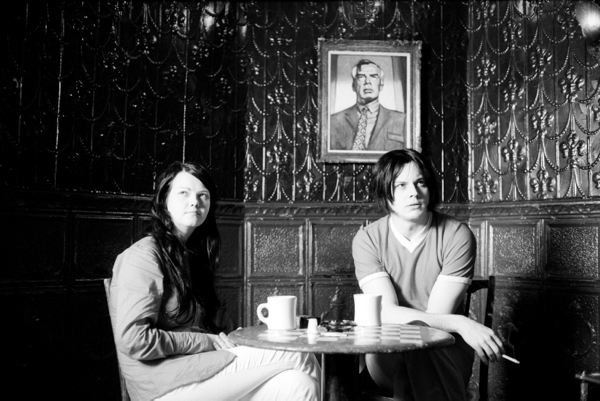Movie review by Greg Carlson
Jim Jarmusch, who has made a habit out of depriving his hardcore fans of regular movie treats (his last film was the brilliant “Ghost Dog: The Way of the Samurai” in 1999), groups together eleven short subjects to make a feature out of “Coffee and Cigarettes,” an interesting and occasionally inspired omnibus populated by Jarmusch’s usual parade of incomparably hip talents. The basic set-up: people conversing in diners, cafes, bars, dives, and other smoking-allowed environs over the caffeine and nicotine-laced items of the title, provides Jarmusch with the perfect opportunity to show off his jazz-like penchant for verbal riffs, complete with harmonies, melodies, solos and recapitulations.
Black and white are the only two colors Jarmusch has ever really needed, and as usual, the rich cinematography (provided by Tom DeCillo, Ellen Kuras, Freddie Elmes, and Robby Muller) is uniformly radiant.
The film’s original segment, which was shown once upon a time on “SNL,” stretches back to 1986, and features a paradox of personalities in its coupling of somnambulant comic Steven Wright and hyperactive Roberto Benigni, who struggle with a language barrier that makes their conversational comprehension as shaky as their java-jolted nerves. One of the movie’s better segments, it prepares viewers unfamiliar with Jarmsuch’s droll, ironic style for what is to come.
It could be immediately argued that each of the segments would work better on its own, but Jarmusch often repeats thoughts, ideas, and even lines of dialogue in ways that unify the whole assemblage. Meg White and Jack White of the White Stripes discuss in some detail the physics theories of Nikola Tesla, and later, Jarmusch will return to the rather beautiful notion that the entire world is a “transmitter of acoustic resonance.” When he does, with Bill Rice and Taylor Mead in the final section, the payoff of their dialogue is heartfelt and bittersweet.
The strongest exchanges comment with subtlety on the odd nature of fame. Iggy Pop and Tom Waits circle around like dogs, trying desperately not to look hurt when each is deeply insulted by the other. Bill Murray sits down with the Wu Tang Clan’s GZA and RZA, who cannot believe that “Groundhog Day, Ghostbustin’ Bill Murray!” is waiting tables. Cate Blanchett plays a dual role, capturing the essence of a movie star and her not-famous cousin, who clearly envies and loathes the privilege that accompanies notoriety and wealth. Alfred Molina and Steve Coogan deliver a clinic on comic timing in their sketch, a commentary on the self-involvement and narcissism that can make celebrities so repugnant when they are off-screen; it is by far the best constructed of the film’s chapters.
Not everything works as well as it should, and some sections struggle to keep up with others. Renee French and E.J. Rodriguez leave you wanting something much more satisfying (despite being the ne plus ultra of Jarmusch’s dizzying demonstration of awkward silences and pregnant pauses). Alex Descas and Isaach de Bankole don’t manage to pull off the right tone for their play on the insecurity and paranoia that can occur between friends. Steve Buscemi, Joie Lee and Cinque Lee have a juicy script that puts Jarmusch’s occasional Elvis fixation at the heart of a tense debate on race, but the piece can’t find the right balance between comic playfulness and social-minded critique. Despite their minor shortcomings, however, the vignettes of “Coffee and Cigarettes” are likely to please longtime Jarmusch devotees as well as newcomers looking for something out of the ordinary.
